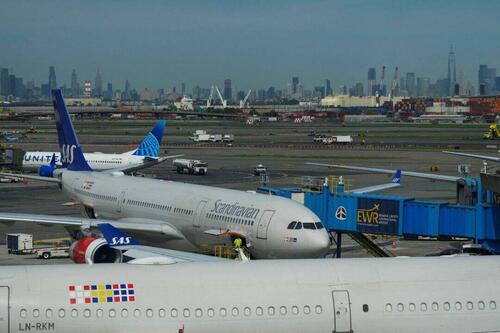US Airports Experience Delays Due To Staffing Issues Caused By Shutdown: Duffy
Major U.S. airports reported widespread delays Monday as the federal shutdown strained an already short-staffed air-traffic system, prompting fresh warnings from industry and labor leaders that the impasse could ripple across the peak travel season.

Transportation Secretary Sean Duffy said air-traffic control towers were contending with mounting absenteeism since the shutdown began Oct. 1, forcing the Federal Aviation Administration to slow operations at times to maintain safety. While roughly 13,000 controllers are classified as essential and continue working, there is no assurance they will be paid on time, he said. About 50,000 Transportation Security Administration officers are also required to report to work; their next paycheck is due Oct. 14.
According to Duffy, he’s been receiving reports of varying levels of absenteeism across the country, which rely on air traffic controllers from the Fededral Aviation Administration (FAA). He said that the department was tracking the staff shortages, which are being reported in “one area in one day, another area another day.”
By late Monday, flight-tracking service FlightAware counted more than 5,500 delayed flights nationwide. The FAA cited staffing impacts at several major airports, including Newark, Phoenix, Denver, Las Vegas and Hollywood Burbank near Los Angeles. Weather compounded the backups. At Denver International, about 32% of arrivals were delayed; Newark saw 22% delayed, while roughly 15% of flights were late at Burbank, according to FlightAware.
The mounting staffing strain threatens to undo progress the FAA has tried to make after years of shortfalls. Many controllers have been working mandatory overtime and six-day weeks, and the agency remains about 3,500 controllers shy of its target staffing levels. The FAA has been surging hiring through its academy in Oklahoma City and training centers nationwide – efforts that rely on support personnel who, Mr. Duffy warned, are at risk of being laid off during the shutdown.
“I don’t want them driving Uber. I don’t want them finding a second job to pay the bills,” the secretary said. “I want them to get paid for the work that they’re doing today, keeping our planes in the air and our skies safe.” He also pressed congressional leaders to reopen the government, criticizing the stalemate on social media.
Labor leaders echoed the call. “We do not have the luxury of time,” said Nick Daniels, president of the National Air Traffic Controllers Association, speaking at Newark Liberty International Airport. “This work includes accelerating the hiring of controllers and modernizing our air-traffic control system. Both initiatives are long overdue and require our immediate and full attention…. End the shutdown.”
Airlines warned of broader repercussions if the funding lapse continues. Airlines for America, which represents United, Delta, American and Southwest, said the system may need to slow down during a prolonged shutdown, eroding efficiency and inconveniencing travelers. In 2019, a 35-day shutdown led to increased absences among controllers and TSA officers and forced the FAA to slow traffic in the New York area—pressure that helped end that impasse. Then-House Speaker Nancy Pelosi said at the time the shutdown was “pushing our airspace to the breaking point.”
The latest shutdown also threatens smaller communities that depend on federal subsidies to maintain service. Mr. Duffy said funding for the Essential Air Service program, which helps airlines serve rural and remote towns, runs out Oct. 12. “There’s many small communities across the country that will now no longer have the resources to make sure they have air service in their community,” he said, noting that Alaska would be among the states affected.
For now, the FAA says U.S. airspace remains safe, and officials are managing traffic flows to match available staffing. But with absenteeism rising and a large contingent of essential workers facing uncertainty over paychecks, the margin for operational flexibility is narrowing. As Mr. Duffy put it: “You’ll see more delays” – and possibly cancellations – “if this continues.”
Tyler Durden
Tue, 10/07/2025 – 09:25ZeroHedge NewsRead More




 R1
R1
 T1
T1


